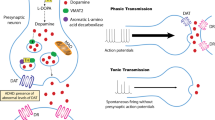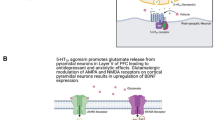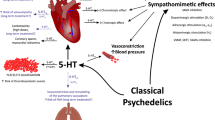Abstract.
The effects of antidepressant drugs on the synthesis of noradrenaline and serotonin (5-HT) were assessed using the accumulation of 3,4-dihydroxyphenylalanine (dopa) and 5-hydroxytryptophan (5-HTP) after decarboxylase inhibition as a measure of the rate of tyrosine and tryptophan hydroxylation in the rat brain in vivo. Three inhibitory synthesis-modulating receptors were investigated simultaneously: the α2C-autoreceptor modulating dopa/noradrenaline synthesis, and the α2A-heteroreceptor and 5-HT1A-autoreceptor modulating 5-HTP/5-HT synthesis.
Acute treatment (2 h, i.p.) with desipramine (1–10 mg/kg), protriptyline (0.3–10 mg/kg) and nisoxetine (3–10 mg/kg), selective NA reuptake blockers, dose-dependently decreased dopa synthesis in cortex (15%–40%) and hippocampus (20%–53%). Fluoxetine (1–10 mg/kg) and zimelidine (1–10 mg/kg), selective 5-HT reuptake blockers, did not alter dopa synthesis. Fluoxetine and zimelidine dose-dependently decreased 5-HTP synthesis in cortex (14%–43%) and hippocampus (27%–54%). Desipramine and protryptyline did not alter 5-HTP synthesis in cortex but in hippocampus it was decreased (36%). Repeated desipramine (10 mg/kg for 1–21 days) or fluoxetine (3 mg/kg for 3–21 days) treatment resulted in a time-dependent loss in their ability to decrease dopa or 5-HTP synthesis. Desipramine (1–21 days) did not alter 5-HTP synthesis in cortex, but in hippocampus it was decreased (21%–37%, days 1–14) followed by recovery to control values (day 21). Fluoxetine (3–21 days) did not alter brain dopa synthesis. To further assess the desensitization of α2C-autoreceptors, α2A-heteroreceptors and 5-HT1A autoreceptors regulating the synthesis of dopa/NA or 5-HTP/5-HT after chronic desipramine and fluoxetine, the effects of clonidine (agonist at α2-auto/heteroreceptors) and 8-OH-DPAT (agonist at 5-HT1A-autoreceptors) were tested. In saline-treated rats, clonidine (1 mg/kg, 1 h) decreased dopa and 5-HTP synthesis in cortex (58% and 54%) and hippocampus (54% and 42%). In desipramine-treated rats (10 mg/kg, 21 days), but not in fluoxetine-treated ones (3 mg/kg, 14 days), the effect of clonidine was attenuated in cortex (12% and 18%) and only for dopa synthesis in hippocampus (31%). In saline-treated rats, 8-OH-DPAT (1 mg/kg, 1 h) decreased 5-HTP synthesis in cortex (63%) and hippocampus (75%). In fluoxetine-treated rats, but not in desipramine-treated ones, this inhibitory effect was markedly attenuated in cortex (26%) and hippocampus (9%).
These findings indicate that acute treatment with cyclic antidepressant drugs results in activation of inhibitory α2C-autoreceptors, α2A-heteroreceptors and/or 5-HT1A-autoreceptors regulating the synthesis of dopa/NA and/or 5-HTP/5-HT in brain, whereas chronic treatment with these drugs is followed by desensitization of these presynaptic receptors.
Similar content being viewed by others
Author information
Authors and Affiliations
Additional information
Electronic Publication
Rights and permissions
About this article
Cite this article
Esteban, S., Lladó, J., Sastre-Coll, A. et al. Activation and desensitization by cyclic antidepressant drugs of α2-autoreceptors, α2-heteroreceptors and 5-HT1A-autoreceptors regulating monoamine synthesis in the rat brain in vivo. Naunyn-Schmiedeberg's Arch Pharmacol 360, 135–143 (1999). https://doi.org/10.1007/s002109900045
Received:
Accepted:
Issue Date:
DOI: https://doi.org/10.1007/s002109900045




